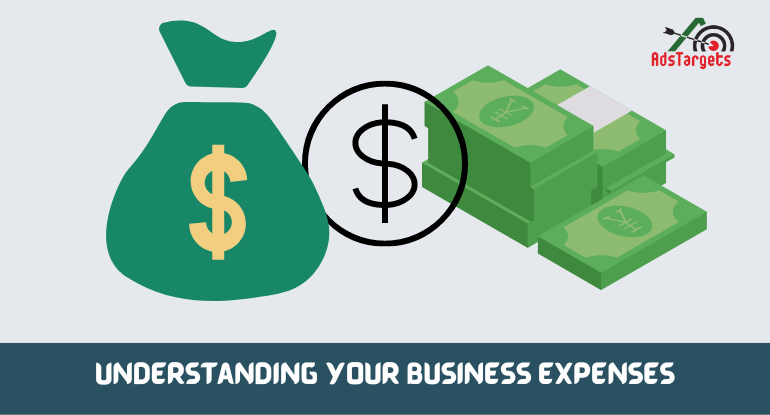Running a business is a juggling act. You’ve got products to develop, customers to serve, and employees to manage. But one area that often gets overlooked, especially for new business owners, is understanding business expenses. Yet, this is one of the most important aspects of running a successful business.
If you want to make smart financial decisions, keep your business profitable, and steer clear of potential financial pitfalls, you need a thorough understanding of your business expenses. Establishing a budget and tracking business expenses are essential for all businesses.
Online businesses also require detailed financial planning and strategic accounting to ensure business expenses are accounted for as supposed. unfortunately, many digital small businesses ignore this important aspect of their businesses.
In this blog post, we’ll talk about the basics of business expenses, like the different kinds of costs you might have, how to keep track of them, which ones are tax-deductible, and how to manage them well. By understanding your business expenses, you can be more in control of your company’s financial decisions.
It’s important to define what business expenses are before delving into their specifics. In the same way that bills for electricity, gas, water, or sewage form part of a utility bill, is a cell phone bill considered a utility bill?
Rental payments, utility bills, the cost of materials, and employee salaries are all examples of business expenses. If you want to make sound financial decisions and run a smooth operation, you need to have a firm grasp on these expenses.

Table of Contents
ToggleVarious Types of Business Expenses
There are different types of business expenses, such as fixed expenses, variable expenses, one-time expenses, and recurring expenses.
- Rent and insurance premiums are two examples of recurring monthly fixed expenses.
- But expenses like the cost of raw materials and overtime pay are examples of variable costs that go up and down as the business runs.
- Expenses that occur only once, such as the purchase of brand-new machinery, are known as “one-time expenses.”
- Payment of periodic expenses, such as taxes paid quarterly or license fees paid annually, takes place according to a predetermined schedule.
Keeping Track of Business Expenses
Maintaining an accurate accounting of your business expenditures is a prerequisite to calculating your profits and losses and is also essential to ensure compliance with government regulations.
You can do this in a number of ways, such as by manually filing away bills and receipts, automating the process with accounting software, or hiring an outside service to handle your bookkeeping for you.
Whatever system you use, it is important to make sure that all periodic expenses are recorded and paid in a timely manner.
Expenses That Can Be Deducted From Your Business Taxes
Certain business expenses are tax-deductible, meaning you can reduce your taxable income by subtracting these costs from your revenue when you calculate your annual taxes.
It’s important to keep proper documentation of these expenses, such as receipts or invoices, and to understand the difference between tax deductions and tax credits.
Common business expenses that can be deducted from your taxes include utilities, rent or mortgage payments, advertising costs, salaries for employees and contractors, travel costs, professional fees like legal or accounting fees, office supplies, and equipment expenses.
How to Manage Your Business Expenses

When you look at your expense reports on a regular basis, you can find ways to save money and plan for future costs.
Business expense management entails the following actions:
- Making and sticking to a budget
- Keeping detailed records of expenses
- Avoiding unnecessary purchases
- Employing zero-based budgeting
- Whenever possible, automate processes.
- Getting ready for tax season
- Never mix business and personal funds.
- Keeping close tabs on cash flow and saving all receipts
In addition, comparing your business’s performance to others in the same sector, keeping an eye on your variable costs, and claiming all of your tax breaks can all be very beneficial. Automating processes whenever possible can be a great way to streamline operations and save time.
Moreover, use a reliable accounting program to help you keep track of business expenses and revenue. Keeping close tabs on cash flow and saving all receipts are two of the most important steps any business owner can take.
Why is Understanding Your Business Crucial to the Success of Your Operation?
There are several reasons for this, including the following:
#1. Good Judgment Based on Accurate Information: When you have a clear understanding of your business, including your expenses, revenue, and profitability, you are better equipped to make informed decisions. This could mean finding ways to cut costs, buying new equipment or technology, or adding more products to your line.
#2. If you want to keep your business afloat, you need to know how to read the financial statements. To avoid financial difficulties, it is important to keep track of your income and expenditures.
#3. Inevitably, as your company grows, you will face new challenges and possible scenarios. By learning the ins and outs of your business, you can spot opportunities for development and expansion, such as expanding into new markets or adding new products or services.
#4. A deeper familiarity with your business operations can also improve your interactions with suppliers, clients, and staff. If you can explain your ideas clearly and show that you understand what your company needs, your partners will trust you, and you’ll be able to form long-lasting partnerships.
Common Mistakes to Avoid When Managing Business Expenses

#1. Mixing Personal and Business Finances: It’s essential to keep your personal and business expenses separate. Mixing the two can lead to accounting errors, make it harder to track expenses, and cause issues during tax time.
#2. Not Keeping Accurate Records: Failing to keep accurate records can cause major headaches down the road, especially during tax season. Missing receipts or incomplete records can result in inaccurate financial statements and missed deductions.
#3. Neglecting to Budget: Many small business owners overlook the importance of budgeting. Without a clear budget, it’s easy to overspend or misallocate funds. Creating and sticking to a budget ensures that you have a roadmap for managing your expenses.
#4. Ignoring Cash Flow: It’s not enough to know what your expenses are—you need to understand when they occur. Failing to monitor your cash flow can lead to shortfalls, even if your business is profitable on paper. Make sure to track when payments are due and plan accordingly.
Conclusion
It’s crucial to your business’ success that you have a firm grasp on your monthly operating costs. You can make better financial decisions, cut down on costs, and keep making money if you properly classify, record, and manage your expenses.
To get your business expenses under control, you need to take immediate action, and we recommend that you do so right now.




